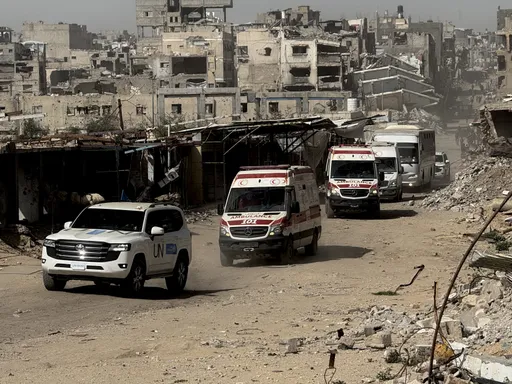Friday, October 29, 2021
Keep schools open in winter, WHO Europe says
The World Health Organization (WHO) Europe has called for schools to stay open – with appropriate measures in place – as the region reported four straight weeks of growing Covid-19 transmission.
The WHO said the Europe region, extending from Greenland in the northwest to the Russian Far East, accounted for 57 percent of new cases worldwide in the third week of October.
"Last year's widespread school closures, disrupting the education of millions of children and adolescents, did more harm than good, especially to children's mental and social well-being. We can't repeat the same mistakes," said Dr Hans Kluge, regional director for WHO Europe.
Last week, with winter approaching, more than half of the European region's 53 countries reported a marked increase in infection rates across all age groups.
While new cases rose 18 percent in the region, WHO's five other regions reported a decline.
A total of 45 countries and territories recommend that schools remain open for in-person learning with infection prevention and control.
Seven countries opted for full or partial school closures, either at a national or sub-national level, while two recommend distance learning.
Moderna to supply 56.5M more doses to GAVI
Moderna Inc has announced a pact with the GAVI vaccine alliance to supply a further 56.5 million doses of its Covid-19 vaccine in the second quarter of next year to low- and middle-income countries.
The vaccine maker said the doses will be in addition to an earlier commitment to supply 60 million doses in the second quarter of 2022 to GAVI, which co-leads the COVAX facility for equitable distribution of Covid-19 shots around the world.
The COVAX facility, backed by the World Health Organization and GAVI, has delivered some 400 million doses to more than 140 low- and middle-income countries, but several countries run the risk of failing to meet WHO's target of 40 percent vaccination coverage by year's end.
Moderna said the doses will be offered at a low price and GAVI continues to retain the option to procure 233 million additional doses in 2022, for a potential total of 500 million doses between this year and next.
"We have recently offered to COVAX to access more vaccines for Q2 and Q3 2022," Moderna Chief Executive Officer Stephane Bancel said.
The company earlier this month announced an investment of up to $500 million to build a facility in Africa with the goal of producing up to 500 million doses of mRNA vaccines each year, including its own shot.
UK records 43,467 cases and 186 deaths
The United Kingdom has recorded 43,467 new cases and 186 deaths of people who had tested positive for the disease within 28 days, data showed.
On a seven-day basis, cases were down 12.7 percent on the week before, while deaths, which typically lag cases, were up 12.6 percent.
G20 want 70 percent of world vaccinated by mid-2022
Finance and health ministers from the world's 20 biggest economies (G20) have said that they wanted 70 percent of the world's population vaccinated against Covid-19 over the next eight months and created a task force to better fight the pandemic.
"To help advance toward the global goals of vaccinating at least 40 percent of the population in all countries by the end of 2021 and 70 percent by mid-2022 ... we will take steps to help boost the supply of vaccines and essential medical products and inputs in developing countries and remove relevant supply and financing constraints," the G20 ministers said in a communique seen by Reuters.
"We establish a G20 Joint Finance-Health Task Force aimed at enhancing dialogue and global cooperation on issues relating to pandemic prevention preparedness and response, promoting the exchange of experiences and best practices, developing coordination arrangements between Finance and Health Ministries, promoting collective action, assessing and addressing health emergencies with cross-border impact, and encouraging effective stewardship of resources," the statement said.
Bulgaria's hospitals overwhelmed by infection surge
Medical workers at Bulgaria’s main emergency hospital are waging an uphill battle as a surge in coronavirus cases has overwhelmed the country's ailing healthcare system.
Following a relatively quiet summer, the Balkan country has been hit hard by another wave of the pandemic as it failed to take tighter containment measures. Bulgaria's health woes have been compounded by a prolonged political crisis that has left the country without a regular government since last spring, eroding public trust in institutions.
Bulgarian health officials blame public mistrust in vaccines and the government — just 1 in 4 adults is fully vaccinated — for the country's current virus predicament.
On Friday, more than 7,553 people were in Bulgarian Covid-19 wards, including 656 in intensive care. More than 90 percent of the patients were not vaccinated, data showed.
In addition, 5,178 new infections and 124 more deaths were reported, bringing the country's death toll to 23,718. Bulgaria has had the highest Covid-19 mortality rate in the 27-nation European Union in the past two weeks.
In response to the worsening situation, Bulgarian hospitals are suspending planned admissions and operations and switching units over to handle the rising numbers of Covid-19 patients.
Italy reports 33 deaths, 5,335 new cases
Italy has reported 33 coronavirus-related deaths against 50 the day before, the Health Ministry said, while the daily tally of new infections rose to 5,335 from 4,866.
Italy has registered 132,037 deaths linked to Covid-19 since its outbreak emerged in February last year, the second-highest toll in Europe after Britain and the ninth-highest in the world. The country has reported 4.76 million cases to date.
Patients in hospital with Covid-19 – not including those in intensive care – stood at 2,658 on Friday, up from 2,609 a day earlier.
There were 18 new admissions to intensive care units, down from 32 on Thursday. The total number of intensive care patients increased to 349 from a previous 347.
Some 474,778 tests were carried out in the past day, compared with a previous 570,335, the Health Ministry said.
China imposes more restrictions
Beijing officials has told residents to postpone weddings and keep funeral ceremonies short, as disease controls across China were tightened.
Residents should "postpone weddings, keep funerals brief, don't organise banquets, and reduce unnecessary gatherings", deputy chief of the city's disease control centre Pang Xinghuo said at a press conference.
Tourist spots will further limit capacity, while the newly opened Universal Studios resort will enter a "state of emergency epidemic prevention", said Beijing's deputy publicity chief Xu Hejian, without giving further details.
Around half of all flights at the capital's two main airports were cancelled, according to Chinese tracking platform Feichangzhun.
Case numbers remain far lower than in most countries, with 48 new domestic infections, bringing the tally to fewer than 250 in the past week.
But China is now grappling with flare-ups in a dozen regions linked to tourists, spurring officials to order millions to stay home, restrict inter-provincial travel and ramp up testing.
Chinese city on Myanmar border pledges curbs despite disruption
In the meantime, a Chinese jade trading hub on the border with Myanmar vowed strict control over domestic outbound travel to halt the spread of the virus, sustaining some of the toughest zero-tolerance policies in China despite economic costs.
After suffering intermittent waves of outbreaks, Ruili has imposed some of the most stringent domestic travel restrictions in China, including self-funded quarantine of at least seven days at centralised facilities for those wishing to leave the city for non-urgent matters.
The controls on departures were temporary and would be adjusted according to the epidemic situation, Ruili's Vice Mayor Yang Mou said, without giving a timeline.
Russia hits record daily death toll
Russia reported 1,163 new Covid-19 deaths, its highest one-day toll of the pandemic, amid a surge in cases that have forced officials to reimpose partial lockdown measures.
Deaths have set new records in nine of the past 11 days. The coronavirus task force also said it had recorded 39,849 new coronavirus cases in the last 24 hours, including 7,511 in Moscow.
Russia will go into a nationwide workplace shutdown in the first week of November, and the capital Moscow reintroduced partial lockdown measures on Thursday, with only essential shops like pharmacies and supermarkets allowed to remain open.
Poland reckons over 3 million Covid-19 cases
Poland's total number of infected cases since the start of the pandemic has passed 3 million, health ministry data showed, with daily cases hitting their highest in the fourth wave as a spike in infections gathers pace.
The 9,387 new cases were Poland's highest since April, with 102 deaths. In total, the country of about 38 million people has reported 3,008,294 cases and 76,875 Covid-19 related deaths.
Ireland sets up new rules
Crowd surfing will not be permitted at concerts in Ireland and nightclub goers must form a socially distanced queue to buy drinks, under new guidelines issued by the government for recently reopened venues.
Irish nightclubs opened their doors for the first time since March 2020 last weekend, while theatres and concert venues also returned to full capacity as the government lifted most curbs that had made up one of Europe's toughest lockdown regimes.
However, with Covid-19 infection rates rising despite Ireland boasting one of the highest vaccination rates in the world, ministers scrambled to put some mitigation measures in place to minimise any further spread and keep the whole economy open.
These included telling performers they should not "partake in high-risk activities" such as crowd surfing, moving through the crowd or throwing personal items from the stage. Neither should they encourage fans to sing along, the guidelines said.
Nights out will also be less spontaneous, with anyone attending a nightclub required to buy a ticket online at least one hour in advance to assist with contact tracing, a measure club owners have been particularly critical of.
Pandemic restraints lessen as South Korea shifts to 'living with Covid-19'
South Korea has announced more relaxing of coronavirus curbs as of November 1 as the country steps into the "living with Covid-19" scheme, local media reported, citing Prime Minister Kim Boo-kyum.
Under the first phase starting on Monday, people will be allowed to gather in groups of up to 10 in the capital city and surrounding areas while up to 12 in groups in other parts of the country regardless of vaccination.
Curfew on operation hours for businesses will also be lifted.
People will continue to wear masks indoors, though, according to the agency report.
The visitors going to bars, nightclubs and indoor gyms must be vaccinated and they will show their vaccination certificate or negative Covid-19 test result if visiting high-risk facilities.
The new measures came amid a recent rise in new cases as South Korea recorded 2,124 new infections in the past 24 hours, bringing the total caseload to 360,536.
With nine more fatalities, the country’s death toll also raised to 2,817, according to the Korean Disease Control and Prevention Agency.
G20 leaders urged to redistribute surplus vaccines
The leaders of the world's 20 biggest economies will meet in Rome this weekend to agree how to transfer surplus Covid-19 vaccines to low-income countries, a group of former presidents and prime ministers have announced.
In a letter to Italian Prime Minister Mario Draghi, one hundred former leaders and government ministers from around the world urged him to use the G20 summit to address what they describe was an unfair distribution of vaccines.
The group said the United States, European Union, Britain and Canada would b e stockpiling 240 million unused vaccines by the end of the month, which these nations' military could immediately airlift to countries in greater need.
By the end of February a total of 1.1 billion surplus vaccines could be transferred, it said.
Indonesia erects monument to heroes
As the global pandemic approaches the grim threshold of 5 million dead, a monument to its victims lists the names of 249 health care workers and 44 civil servants who died of the virus in Indonesia's West Java province.
The monument was originally built two years ago as a gate-shaped structure that provides a view to the nearby West Java Struggle Monument, a shrine in memory of people's efforts to defend Indonesian independence in the region.
It is located just across Gedung Sate, the West Java governor's office in Bandung.
The monument is the first in the archipelago to remember the people's fight against the pandemic, as Indonesia's first three patients were found in West Java province.
Mexico's death toll rises to 287,631
Mexico has added 357 new fatalities, bringing the country's overall death toll from the pandemic to 287,631.
Officials have said the health ministry's official figures likely represent a significant undercount of deaths due to a lack of widespread testing.
Nicaraguan nationals go to Honduras for jab
People in Nicaragua are crossing the border into Honduras to be vaccinated with Pfizer and Moderna, rather than the Cuban and Russian vaccines on offer in their own country.
Many are entering Honduras illegally, some crossing the border on horseback or on rafts.
Nicaraguans normally aren't restricted from entering Honduras, but due to the pandemic they are required to show a negative test result, something that can cost $150.
Honduras has more than 7 million people older than 12 who would be eligible for vaccination and 6.7 million doses have been applied according to the health ministry.
South Korea eases virus restrictions
South Korea has said it will drop all operating-hour curbs on restaurants and cafes and implement its first vaccine passport for high-risk venues, such as gyms, saunas and bars, as it tries to "live with Covid-19".
The first phase will go into effect on Monday and last for a month, officials said, with plans calling for all restrictions to be scrapped by February.
The push comes as South Korea still grapples with high daily case numbers, though they remain far below many of the worst hit countries, and serious infections and deaths are low.
South Korea reported 2,124 new cases , bringing its cumulative tally to 360,536 infections with 2,817 deaths.
Australia's vaccination drive reaches Antarctica's frozen shores
The virus vaccines have arrived at Australia's Casey research station in Antarctica, allowing expeditioners to be inoculated before they journey back home to a country reopening to the world.
Australia is gradually easing pandemic restrictions as it boosts vaccination levels after its southeast was rocked by a third wave of infections fuelled by the Delta variant.
Sydney and Melbourne, its largest cities, are readying to welcome fully vaccinated residents flying from overseas without quarantine from November 1 - the first time in over 18 months. Outbound travel ban will also be lifted then.
Pfizer Inc vaccines for 27 staff at Australia's Casey Station in Antarctica had arrived, Federal Environment Minister Sussan Ley said.
Vaccines will also be delivered to its Davis and Mawson research stations.























